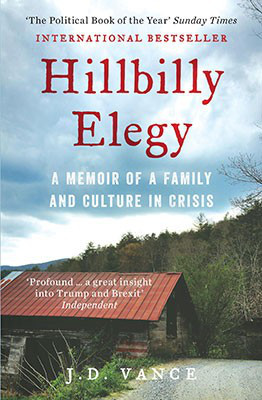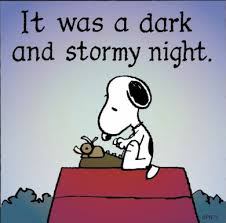“Americans call them hillbillies, rednecks, or white trash. I call them neighbors, friends, and family.”
This is one of those books I’d heard high praise about from America but never thought I’d be able to get hold of in the UK. I looked into borrowing it from the public library on my last trip to the States, but even nearly a year after its publication the reservation list was still a mile long. So I was delighted to hear that Hillbilly Elegy was being released in paperback in the UK last month. For British readers, it will provide a welcome window onto a working-class world that is easily caricatured but harder to understand in a nuanced way.
J.D. Vance knows hillbilly America from the inside but also has the necessary distance to be able to draw helpful conclusions about it: born in the “Rust Belt” of Ohio to parents who didn’t complete high school, he served in the Marine Corps in Iraq, attended Ohio State University and Yale Law School, and became a successful investor with a venture capital firm. He was one of the lucky ones who didn’t give into lower-middle-class despair and widespread vices like alcoholism and hard drugs, even though his mother was an addict and installed a “revolving door of father figures” in his life after his father abandoned them.
 Vance attributes his success to the stability provided by his grandparents, his beloved Mamaw and Papaw. They were part of a large wave of migration from Kentucky to Ohio, where they moved so Papaw could work in the Armco Steel mill. Prejudice assaulted the couple from both sides: Kentucky folk thought they’d grown too big for their britches, while in Ohio they were maligned as dirty hillbillies. Mamaw, in particular, is a wonderful character so eccentric you couldn’t make her up, with her fierce love backed up by a pistol.
Vance attributes his success to the stability provided by his grandparents, his beloved Mamaw and Papaw. They were part of a large wave of migration from Kentucky to Ohio, where they moved so Papaw could work in the Armco Steel mill. Prejudice assaulted the couple from both sides: Kentucky folk thought they’d grown too big for their britches, while in Ohio they were maligned as dirty hillbillies. Mamaw, in particular, is a wonderful character so eccentric you couldn’t make her up, with her fierce love backed up by a pistol.
The book is powerful because it gives concrete, personal examples of social movements: it’s no dry history of how the Scots-Irish residents of Appalachia switched allegiance from the Democratic Party to the Republican after Richard Nixon, though Vance does fill in these broad brushstrokes, but a family memoir that situates Mamaw and Papaw’s experience, and later his own, in the context of the history of the region and the whole country.
I most appreciated the author’s determined use of the first-person plural, especially later in the book: he includes himself in the hillbilly “we” such that he’s not some newly gentrified snob denouncing welfare queens: he knows these people and this lifestyle and recognizes its contradictions; he also knows that but for the grace of God he could have slipped into the same bad habits.
Jackson [Kentucky] is undoubtedly full of the nicest people in the world; it is also full of drug addicts and at least one man who can find the time to make eight children but can’t find the time to support them. It is unquestionably beautiful, but its beauty is obscured by the environmental waste and loose trash that scatters the countryside. Its people are hardworking, except of course for the many food stamp recipients who show little interest in honest work.
At Yale Law School Vance felt out of place for the first time in his life. One of the most important things he learned from professors like Amy Chua was the value of social capital: in his new world of lawyers, senators and judges it really was all about who you know. At law firm interviews, he had no idea what cutlery to use in restaurants and had to text his girlfriend for help. For as much as he’s adapted to non-hillbilly life in the intervening years, he still notices in himself the hallmarks of a stressful, impoverished upbringing: a fight or flight approach to conflict and an honor culture that makes him prone to nurturing feuds.
Although I enjoyed it simply as a memoir, I can see this book especially appealing to people who are interested in the politics and psychology of the lower middle class (perhaps an American equivalent to Owen Jones’s Chavs, a book I never got through). British readers will, I think, be surprised to learn that Vance is on the conservative end of the spectrum and has political aspirations. Essentially, he doesn’t think the government can fix things for struggling country folk, though certain social policies might help. He seems to think it’s more a question of personal responsibility – and also that churches have a major role to play.
There is a cultural movement in the white working class to blame problems on society or the government, and that movement gains adherents by the day.
Mamaw always had two gods: Jesus Christ and the United States of America. I was no different, and neither was anyone else I knew.
(These strike me as alien ideas in the UK, apart from short-lived strategies like David Cameron’s “Big Society” – except, perhaps, if one goes all the way back to Thatcherism.)
Much has been made in the British press about this book’s ability to explain the rise of Donald Trump. This is an overstatement, and perhaps even misleading, when you consider the author’s conservatism; he never mentions Trump, and never engages in any specific political discussions. But what it is helpful for is exposing a mindset of rugged, defiant individualism that often shades into hopelessness. I have my own share of redneck relatives, and though I feel far removed from the world Vance depicts, I can see its traces in my family tree. I’m glad he had the guts to draw on his experience and write this hard-hitting book.
My rating: 
Hillbilly Elegy: A Memoir of a Family and Culture in Crisis was first published in the UK by William Collins in September 2016. My thanks to Katherine Patrick for sending a free paperback for review.
Note: Ron Howard is to direct and produce a movie version of the book.
Advertisements Share this:- Nonfiction Reviews




![[178].png](/ai/061/918/61918.png)
